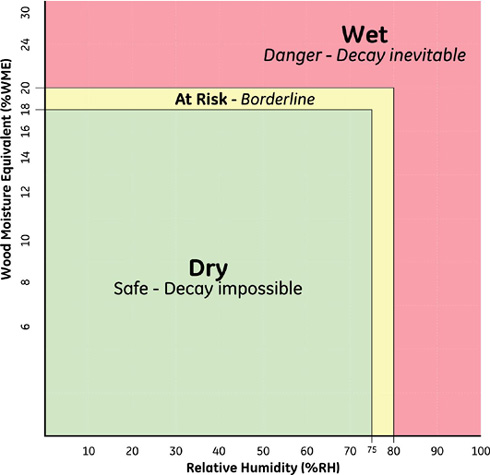






Measuring Dampness
When measuring moisture, there will be a level of dampness where excessive moisture causes a problem,
decay or breakup of the structure. It is possible to mark when an electronic device indicates ‘Safe - Dry’,
‘Intermediate – At Risk’ and ‘Danger - Wet’. The diagram below details the three bands of dampness.

Dry (Green band) - indicates that the moisture content is ‘Dry’ and no decay will take place.
At Risk (Yellow band) – indicates that the moisture content is high and ‘At Risk’ of causing a problem.
Wet (Red band) – indicates excessive levels of moisture ‘Wet’ and decay is inevitable.
Please note that this chart can not be utilised to convert %WME into %RH. It is imperative to use the correct test for each reading.
It is important to note that dampness is a hazard long before a material can become visibly damp and damp to the touch. With most materials we can only physically see any problems when the moisture is 85% humidity or higher. This is why it is essential to use a Protimeter moisture meter when surveying for damp.
What Is Condensation?
Condensation is the process whereby water vapour in the atmosphere is returned to its original liquid state. All air contains
water vapour of varying quantities. Cooling below the dew point will induce condensation.
Over the past forty years, natural ventilation was greatly reduced by the introduction of double glazing, draught excluders,
fitted carpets which prevents air movement through suspended floors and central heating with the removal of open fires.
Houses have become more effectively sealed, keeping any moisture produced within the house and providing better conditions
for condensation to occur.
Is it caused by a life style issue?
Condensation in houses is mainly a winter problem particularly where warm moist air is generated in living areas and then
penetrates to the colder parts of the building. The effect of moisture generation is made worse by keeping the moist air
in the house - it is theoretically possible to avoid condensation by adequate ventilation. Usually in certain areas of a
house (such as bathrooms and kitchens) the warm air contains a lot of moisture, if that air then spreads to cooler
parts of the house, it will condense on any colder surface.
When conducting an assessment of a property, first ascertain if a life style issue is the cause of the problem. Conduct a
survey utilising the condensation mode, recording the humidity, ambient temperature, dew point temperature, surface
temperature and difference function. On completion the instrument will indicate if there is condensation or not,
allowing the operator to determine if there is a life style issue.
If no condensation is recorded, conduct a structural survey utilising the measure mode.
Next - How To Use Protimeter MMS?
Previous - What Is The Protimeter MMS?
Help and Support
Contact Us
Protimeter Brochures
Protimeter Manuals
How To Articles
Useful Links
Sitemap
Protimeter Range
Protimeter Mini
Protimeter Aquant2
Protimeter Surveymaster2
Protimeter Hygromaster
Protimeter Psyclone
Protimeter Timbermaster
Protimeter MMS2
Protimeter Salt Analysis Kit
Protimeter Speedy Moisture Meter
About Survey Express Services
www.surveyexpress.co.uk
Company Information
Store Locations
Terms & Conditions
Privacy Policy
Cookie Policy
Enquiry For Protimeter Moisture Meter

www.Damp-Meter-Direct.co.uk is run by Survey Express Services - the UK's largest approved dealer of Protimeter moisture meters
Copyright ©2015 Survey Express Services. All rights reserved | Terms & Conditions | Privacy Policy | Cookie Policy
Keywords: moisture meter, damp meter, protimeter, protimeter moisture meter, protimeter mms2, mms2, protimeter mms2 moisture meter, ge protimeter, ge sensing
Links: Leica Disto D110, Leica Disto D2, Leica Disto D210, Leica Disto X310, Leica Disto D510, Leica Disto D810